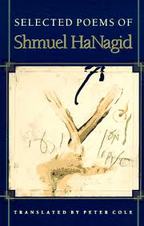Selected Poems of Shmuel HaNagid
Translated from the Hebrew by Peter Cole
Princeton: Princeton University Press, 1996
published in the Voice Literary Supplement (New York), April 1996
Born a thousand years ago in Cordoba, the cosmopolitan capital of Muslim Spain, Shmuel HaNagid rose to become not only a prominent Talmudist and the governor of Andalusian Jewry but, in a time of city-states, Chief Vizier to the Berber court of Granada and the commander of its Muslim army (which he successfully led into battle for most of 20 years). His name, however, has come down to us because he was also the first major poet in the Hebrew literary renaissance that later included Solomon ibn Gabirol and Yehudah HaLevi.
The retrieval of all this secular poetry, long neglected or lost---from a time that was medieval for the rest of Europe but the golden age for Muslim and Jewish culture in Spain---dates back to the modern Hebrew revival of the last century. HaNagid was little known until his diwan, or collected poems, in a 16th-century copy of an 11th-century original, was passed on to the poet Hayim Nahman Bialik by a collector in 1926. His work has been sporadically available in English, but in versions that suffered from the journey.
Peter Cole's edition of HaNagid, a dozen years in the making, is the most comprehensive yet in English. His taut, lightfooted translations---of lyrics, epigrams, and epic narratives---are remarkable in the degree to which they carry over the distinct poetic complexities of the original while retaining a crisp, contemporary sense of American poetics. Sometimes their musicality recalls another poet-translator, Paul Blackburn, with his Provençal troubador lyrics, as in "On Fleeing His City":
And the friends who fray me,
their fine physiques
and slender thinking, _
thinking it's ease or gain
that drives me,
pitching from place to place,
my hair wild, my eyes
charcoaled with night---
and not a one speaks wisely,
their souls blunted, or blurred,
goat-footed thinkers.
Like other Judeo-Spanish poets, HaNagid wrote in a Hebrew constantly interwoven with phrases, images, and anecdotes that drew from and commented on the Bible, thereby collapsing "the present of his poetry into an eternal and messianically allusive past," as Cole states in his introduction. Moreover, such poets borrowed and adapted Arabic models to revitalize their own poetic tradition. These depths and departures in the language were familiar to readers of the time, but the modern reader, of course, is not in the same position.
Cole's extensive notes help to situate the reader, with a generous sampling of the many citations and echoes at play. In the long poems---the elegies to his brother, martial poems like "The Victory Over Seville," the wine poem "How I Helped the Wise"---the notes enable us to glimpse the intricate mosaic that HaNagid made of his materials. Yet, most often the quality of motion and emotion comes through directly in the translations. The epigrams especially, which comprise half this volume, spring alive with the poet's quick grace:
The multiple troubles of man,
my brother, like slander and pain,
amaze you? Consider the heart
which holds them all
in strangeness, and doesn't break.
HaNagid has been well served. At last, it seems, he has made the trip through to us intact.
